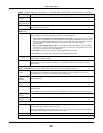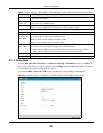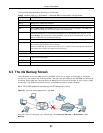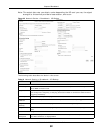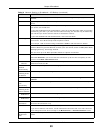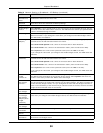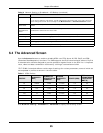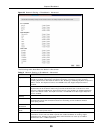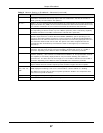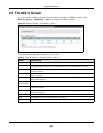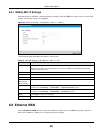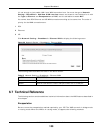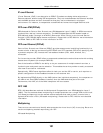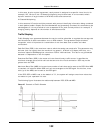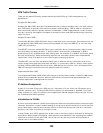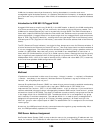
Chapter 6 Broadband
VMG5313-B10A/-B30A Series User’s Guide
97
G.lite : ITU G.992.2 (better known as G.lite) is an ITU standard for ADSL using discrete multitone
modulation. G.lite does not strictly require the use of DSL filters, but like all variants of
ADSL generally functions better with splitters.
T1.413 : ANSI T1.413 is a technical standard that defines the requirements for the single asymmetric
digital subscriber line (ADSL) for the interface between the telecommunications network and
the customer installation in terms of their interaction and electrical characteristics.
ADSL2 : It optionally extends the capability of basic ADSL in data rates to 12 Mbit/s downstream
and, depending on Annex version, up to 3.5 Mbit/s upstream (with a mandatory capability
of ADSL2 transceivers of 8 Mbit/s downstream and 800 kbit/s upstream).
AnnexL : Annex L is an optional specification in the ITU-T ADSL2 recommendation G.992.3 titled
Specific requirements for a Reach Extended ADSL2 (READSL2) system operating in the
frequency band above POTS, therefore it is often referred to as Reach Extended ADSL2 or
READSL2.The main difference between this specification and commonly deployed Annex A is
the maximum distance that can be used. The power of the lower frequencies used for
transmitting data is boosted up to increase the reach of this signal up to 7 kilometers
(23,000 ft).
ADSL2+ : ADSL2+ extends the capability of basic ADSL by doubling the number of downstream
channels. The data rates can be as high as 24 Mbit/s downstream and up to 1.4 Mbit/s
upstream depending on the distance from the DSLAM to the customer's premises.
AnnexM : Annex M is an optional specification in ITU-T recommendations G.992.3 (ADSL2) and
G.992.5 (ADSL2+), also referred to as ADSL2 M and ADSL2+ M. This specification extends
the capability of commonly deployed Annex A by more than doubling the number of
upstream bits. The data rates can be as high as 12 or 24 Mbit/s downstream and 3 Mbit/s
upstream depending on the distance from the DSLAM to the customer's premises.
VDSL Profile VDSL2 profiles differ in the width of the frequency band used to transmit the broadband
signal. Profiles that use a wider frequency band can deliver higher maximum speeds.
8a, 8b, 8c, 8d,
12a, 12b, 17a,
US0
The G.993.2 VDSL standard defines a wide range of profiles that can be used in different
VDSL deployment settings, such as in a central office, a street cabinet or a building.
The VMG must comply with at least one profile specified in G.993.2. but compliance with
more than one profile is allowed.
Apply Click Apply to save your changes back to the VMG.
Cancel Click Cancel to return to the previous configuration.
Table 12 Network Setting > Broadband > Advanced (continued)
LABEL DESCRIPTION



